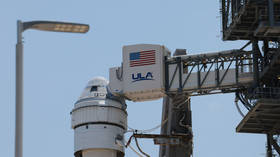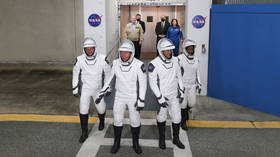Boeing’s first crewed spaceflight to take off despite defect

Boeing said on Friday that it will conduct its first astronaut launch in June. The test flight, which will see its Starliner capsule carry two people into space for the first time, was canceled earlier this month due to a rocket defect and a helium leak.
The capsule will take off from Cape Canaveral in Florida aboard a United Launch Alliance (ULA) Atlas V rocket on June 1, NASA and Boeing officials said at a press conference. Should that launch date be missed, they added, June 2, 5, and 6 have been selected as alternate dates.
The Starliner will carry NASA astronauts Suni Williams and Butch Wilmore to the International Space Station. If successful, the reusable capsule will enter into regular service ferrying NASA personnel to and from the ISS.
Developed specifically for this purpose, Boeing’s Starliner project has suffered years of delays and is roughly $1.5 billion over budget. Its first crewed flight was originally scheduled for 2017, but repeated technical glitches and certification issues saw that date pushed back to May 7 of this year.
However, the mission was canceled two hours before lift-off when an oxygen valve issue was discovered on the Atlas V rocket. Technicians then discovered a helium leak in the Starliner’s onboard propulsion system, and another two launch dates in May were scrubbed.
The leak has not been fixed, but NASA and Boeing concluded that it can be managed in flight and will not pose a threat to the astronauts. “We know we can manage this, so this is really not a safety of flight issue,” Mark Nappi, the vice president of Boeing’s Commercial Crew Program, told reporters on Friday.
NASA has “flown vehicles with small helium leaks” before, NASA manager Steve Stich added.
Over the years that Boeing’s first manned flight has been delayed, the company leading competitor – Elon Musk’s SpaceX – has pulled ahead. SpaceX has been flying astronauts to the ISS since 2020, and the company’s Crew Dragon capsule has also been used by private spaceflight firm Axiom Space for three crewed missions to the station.
Both the Crew Dragon and Starliner projects received funding from NASA, with Boeing given $4.2 billion and SpaceX receiving $2.6 billion.
Back in 2022, Russian space agency chief Dmitry Rogozin stated that Russian cosmonauts would not fly on the Starliner.
“It flew for the first time with trouble. The second time it couldn’t fly at all. The delay of the launch has been going on for over two years now. Now, they will try to launch it. But we will definitely not put any of our cosmonauts [on board], we cannot risk their lives,” he told the Rossiya 24 TV channel at the time.
Several months later, Roscosmos and NASA signed an agreement whereby American astronauts would fly aboard Russian Soyuz MS spacecraft and Russian cosmonauts would take part in Crew Dragon flights once per year.













